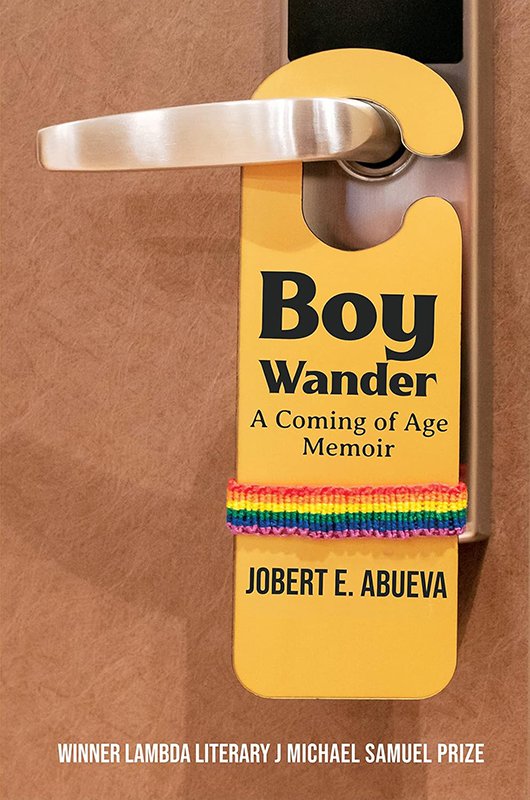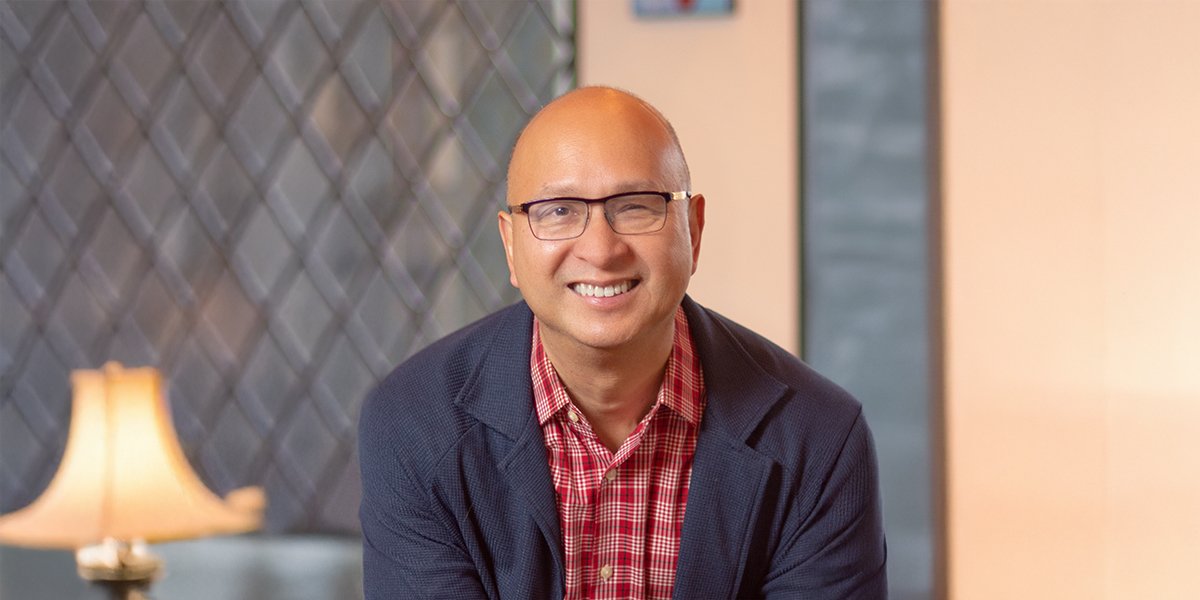PHOTO: Jobert E. Abueva, author of Boy Wander, photographed at home in New Hope, Pennsylvania.
Memoir of Identity, Courage, and Cultural Discovery
Jobert E. Abueva reflects on his international upbringing, hidden identities, and writing process behind Boy Wander, offering heartfelt insights on resilience, vulnerability, and the liberating power of telling one’s truth.
Jobert E. Abueva crafts a powerful and intimate portrait of self-discovery in Boy Wander – A Coming of Age Memoir, a Lambda Literary Award-winning work that spans continents and decades. With a life shaped by Manila, Kathmandu, Bangkok, Tokyo, and eventually the United States, Abueva takes readers on a journey through cultural contrasts, hidden identities, and the search for belonging—all told with striking honesty and lyrical precision.
Far more than a chronicle of queer youth, Boy Wander is a testament to courage, memory, and the strength found in embracing one’s full truth. In this conversation with Reader’s House, Abueva reflects on the personal and political forces that shaped his life, the emotional terrain of writing memoir, and the enduring power of vulnerability in storytelling.
Abueva’s voice is fearless, elegant, and profoundly human—his memoir illuminates the complexities of identity with striking honesty and emotional resonance.
‘Boy Wander’ details your life across Manila, Kathmandu, Bangkok, and Tokyo. How did these diverse cultures influence your personal journey?
Each of these cities from my boyhood left a unique imprint on who I am. In Manila, where I was born, I learned of resilience and warmth amid political upheaval and where community and family are deeply intertwined. Kathmandu introduced me to a world of spiritual depth; its majestic landscapes and mystical rituals nurtured a reflective and introspective side of me. The same goes for Bangkok which was a celebration of contrasts—the energetic vibrancy of street life, the fusion of old and new, and a palpable pulse that taught me spontaneity and adaptability. Then there’s where I spent my high school years, Tokyo, a city where precision meets tradition, inspiring discipline and an appreciation for the subtle beauty of everyday moments.
These diverse cultures wove into the fabric of my personal journey and to this day my career remains global in scope, and I am nomadic by nature. They have enriched my understanding of what it means to belong and helped me embrace the beautiful complexity of my own identity. The lessons I gleaned from each place have fueled my narrative, shaping Boy Wander into a memoir that is as much about finding home in the world as it is about finding oneself.
Your memoir reveals a dual life as a high-achieving student and a clandestine existence at Tokyo’s Imperial Hotel. How did you navigate these contrasting identities during your youth?
Navigating those contrasting identities was like walking a tightrope between two distinct, yet equally vital worlds. On one side was the disciplined life of a high-achieving student—a realm where expectations were clear and every success, academic and otherwise, was measured against a strict internal bar set by family and society. On the other, there was the clandestine existence at Tokyo’s Imperial Hotel, a place where the usual rules dissolved, allowing me to explore a deeper, perhaps wilder, and often misunderstood part of myself.
The key was compartmentalization to live in both realms without letting one overpower the other. I learned to switch gears, being adept at keeping things, er, straight. A more complex, resilient identity took shape, which is the narrative thrust behind Boy Wander. Ultimately the journey to self-understanding is rarely linear, and embracing our contradictions is what makes our stories rich and real.
“Navigating those contrasting identities was like walking a tightrope between two distinct, yet equally vital worlds.” – Jobert Abueva
In ‘Boy Wander’, you discuss your experiences before the advent of AIDS. How did this era shape your understanding of sexuality and identity?
Even as an adolescent, reading the initial headlines of a gay cancer, I sensed that my encounters, as thrilling and daring as they were, were also entering an unchartered, guarded zone that by the time I arrived in America, made me reconsider how promising this new land of opportunity may be.
I discovered that sexuality was not merely a series of physical encounters, but a profound window into who I was becoming. Our interactions, free from the pervasive fear that would later grip our community, allowed me to embrace a more spontaneous and, in many ways, innocent exploration of self. This era taught me that sexuality and identity are intricately entwined—each encounter, each secret meeting early on, was a step toward understanding the depth of our own humanity. The absence of AIDS did not mean there was no risk; it was an environment in which emotional and social risks were taken without the immediate weight of a looming epidemic. In retrospect, I realized that this unguarded exploration, while beautiful, also set the stage for a later reckoning, time when our freedoms were suddenly redefined by loss, fear, and the urgent need for compassion.
Your story spans from the 1960s and 70s to your arrival in America. How did these different time periods affect your self-acceptance journey?
The 1960s and 70s were marked by cultural revolution and personal experimentation as well as charged with the energy of rebellion and artistic exploration, when I was boldly testing the boundaries of who I was expected to be. I eventually learned that self-acceptance was not something handed down by society; it had to be forged through introspection, risk, and often a quiet defiance of conventional norms. However, this was also a time marked by internal conflict and isolation, as traditional (Catholic) values still loomed large and made it challenging to fully embrace every facet of my emerging identity.
Arriving in America introduced me to a whole new dynamic. The cultural landscape was both liberating and complex, and where I could explore my authentic self even further. Yet, this new freedom came with its own set of challenges—reconciling my global roots with the pressures to assimilate and find a balance between the daring independence of my past and the expectations of a new society.
‘Boy Wander’ has received multiple accolades, including the Book Excellence Award and Reader’s View Bronze Award. How have these recognitions impacted you?
Receiving accolades like those mentioned and others since has been both humbling and rewarding. Such recognitions have affirmed that the deeply personal journey I shared in Boy Wander resonates with a diverse community of readers. They validate that being honest about my struggles and triumphs isn’t just cathartic—it’s a powerful connection point that others value. Moreover, they have fueled my creative spirit, to keep pushing with my writing. A nice biproduct is that awards open doors to connect with readers, fellow writers, and communities who see reflections of their own journeys in my work. This broader recognition not only spreads my story further but also fosters deeper discussions about identity, cultural crossovers, and the evolving nature of self-acceptance. And I do hope it inspires others to write with brutal honesty and vulnerability.
Your writings have appeared in publications like The New York Times and The Philadelphia Inquirer. How has your journalistic work influenced your memoir writing?
My work as a freelance journalist has enriched my approach to memoir writing. In journalism, every word counts. Crafting articles that are both factual and engaging taught me to choose my words deliberately, an invaluable skill when recounting personal memories. This precision helped me present my experiences in Boy Wander with both clarity and depth. Journalistic writing demands a delicate balance between reporting facts and evoking emotion. This journey allowed me to navigate the personal terrain of my memoir with authenticity, ensuring that while the narrative remains raw and deeply personal, it also resonates with a broader audience through contextual accuracy and clarity. My narrative lives through the Vietnam War, martial law in the Philippines and the U.S. Bicentennial, among other world events.
My journalistic background has provided me with the tools to distill complex personal experiences into a narrative that is both rigorously edited and intimately affable. It’s a continuous interplay between the meticulous care of fact-checking and the fearless exploration of memory, ensuring that every piece of my story carries the weight of truth as well as the raw beauty of being human.
As a storyteller who has performed on stage, how does live storytelling compare to writing for you?
For me, live storytelling is like stepping into a shared heartbeat of the moment, while writing is a quiet conversation with my own inner truths. When I’m on stage, I feel a contagious energy, the audience’s laughter, gasps, or even reflective silence feed into my delivery. The immediacy of live performance makes vulnerability palpable; I’m giving my story directly, and that raw connection, that spark of mutual understanding, is incredibly exhilarating. Writing, on the other hand, is a solitary, meticulous craft. It allows me to sift through memories, layer them with reflection, and polish each nuance at my own pace. It’s like sculpting my past—revisiting each detail, reshaping it until it mirrors the truth I want to share. Both modes of storytelling reveal a slice of my truth with the intent of connecting with others.
What advice would you offer aspiring authors, especially those writing about personal and challenging experiences?
The journey of writing, especially when it is about personal and challenging experiences, is both brave and transformative. Rember that every life is unique, and your story is yours alone. Embrace the raw authenticity of your experiences. Do not shrink from the parts that feel painful or messy; those are often the parts that hold the greatest truth and potential for healing—not just for you, but for your readers as well. It sure has been the case for me.
Delving into personal history can uncover old wounds. Give yourself permission to feel and, if necessary, take breaks. (It took me 20 years, on and off, to complete my memoir!). Remember that while your writing is a gift to the world, it’s also a deeply personal process. Establish safe spaces in your routine where you can write without judgment or haste.
Also, connect with trusted peers, mentors, or writing groups who understand the delicate balance of vulnerability and craft. Their feedback can help you polish your work without diluting your authentic voice. Three distinct writing groups have reviewed chapters of Boy Wander. And I am grateful to every one of them.
Writing about personal challenges is both an act of courage and a gift to others. Your vulnerability has the power to connect, heal, and inspire, so trust your voice, be patient with your journey, and know that every step, however painful, is paving the way to a more authentic and compassionate existence.
EDITOR’S CHOICE
Powerful, raw, and beautifully written—Boy Wander is a courageous journey of identity, resilience, and self-discovery that deeply resonates.



